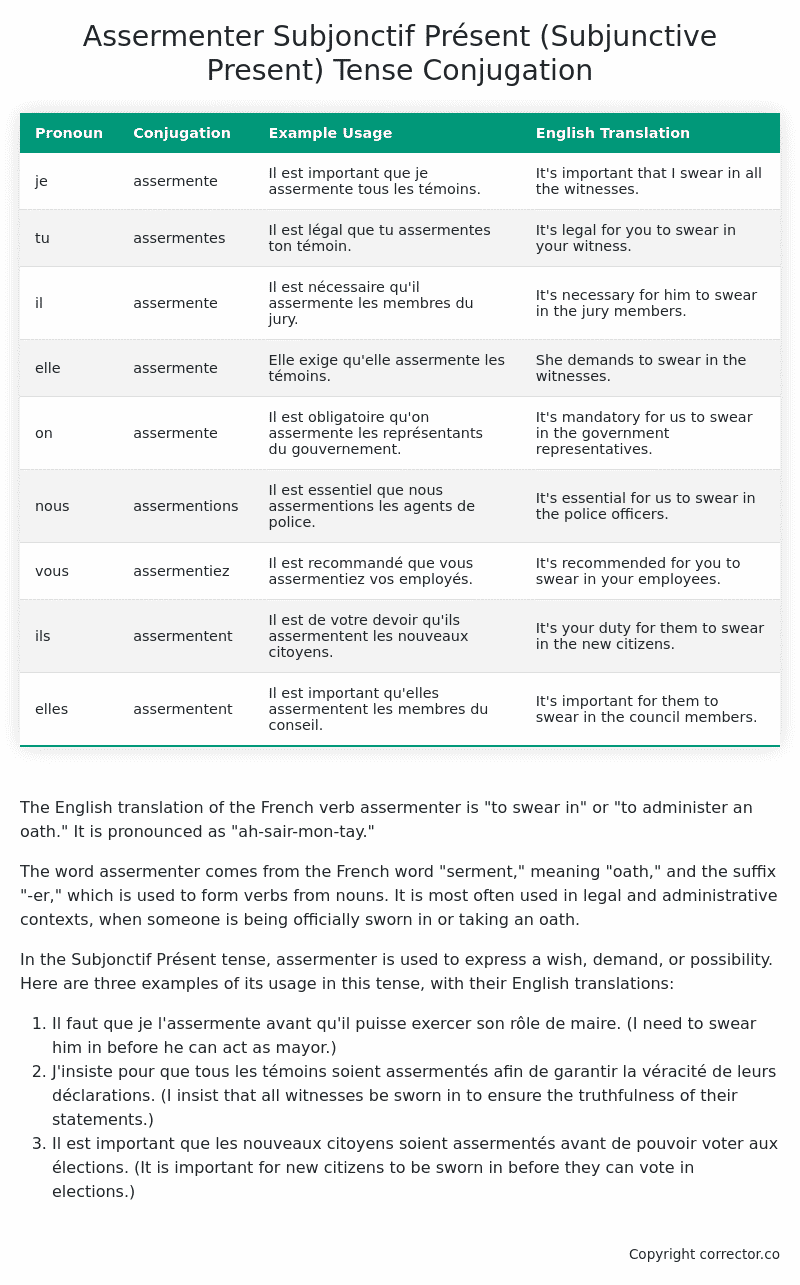Subjonctif Présent (Subjunctive Present) Tense Conjugation of the French Verb assermenter
Introduction to the verb assermenter
The English translation of the French verb assermenter is “to swear in” or “to administer an oath.” It is pronounced as “ah-sair-mon-tay.”
The word assermenter comes from the French word “serment,” meaning “oath,” and the suffix “-er,” which is used to form verbs from nouns. It is most often used in legal and administrative contexts, when someone is being officially sworn in or taking an oath.
In the Subjonctif Présent tense, assermenter is used to express a wish, demand, or possibility. Here are three examples of its usage in this tense, with their English translations:
- Il faut que je l’assermente avant qu’il puisse exercer son rôle de maire. (I need to swear him in before he can act as mayor.)
- J’insiste pour que tous les témoins soient assermentés afin de garantir la véracité de leurs déclarations. (I insist that all witnesses be sworn in to ensure the truthfulness of their statements.)
- Il est important que les nouveaux citoyens soient assermentés avant de pouvoir voter aux élections. (It is important for new citizens to be sworn in before they can vote in elections.)
Table of the Subjonctif Présent (Subjunctive Present) Tense Conjugation of assermenter
| Pronoun | Conjugation | Example Usage | English Translation |
|---|---|---|---|
| je | assermente | Il est important que je assermente tous les témoins. | It’s important that I swear in all the witnesses. |
| tu | assermentes | Il est légal que tu assermentes ton témoin. | It’s legal for you to swear in your witness. |
| il | assermente | Il est nécessaire qu’il assermente les membres du jury. | It’s necessary for him to swear in the jury members. |
| elle | assermente | Elle exige qu’elle assermente les témoins. | She demands to swear in the witnesses. |
| on | assermente | Il est obligatoire qu’on assermente les représentants du gouvernement. | It’s mandatory for us to swear in the government representatives. |
| nous | assermentions | Il est essentiel que nous assermentions les agents de police. | It’s essential for us to swear in the police officers. |
| vous | assermentiez | Il est recommandé que vous assermentiez vos employés. | It’s recommended for you to swear in your employees. |
| ils | assermentent | Il est de votre devoir qu’ils assermentent les nouveaux citoyens. | It’s your duty for them to swear in the new citizens. |
| elles | assermentent | Il est important qu’elles assermentent les membres du conseil. | It’s important for them to swear in the council members. |
Other Conjugations for Assermenter.
Le Present (Present Tense) Conjugation of the French Verb assermenter
Imparfait (Imperfect) Tense Conjugation of the French Verb assermenter
Passé Simple (Simple Past) Tense Conjugation of the French Verb assermenter
Passé Composé (Present Perfect) Tense Conjugation of the French Verb assermenter
Futur Simple (Simple Future) Tense Conjugation of the French Verb assermenter
Futur Proche (Near Future) Tense Conjugation of the French Verb assermenter
Plus-que-parfait (Pluperfect) Tense Conjugation of the French Verb assermenter
Passé Antérieur (Past Anterior) Tense Conjugation of the French Verb assermenter
Futur Antérieur (Future Anterior) Tense Conjugation of the French Verb assermenter
Subjonctif Présent (Subjunctive Present) Tense Conjugation of the French Verb assermenter (this article)
Subjonctif Passé (Subjunctive Past) Tense Conjugation of the French Verb assermenter
Subjonctif Imparfait (Subjunctive Imperfect) Tense Conjugation of the French Verb assermenter
Conditionnel Présent (Conditional Present) Tense Conjugation of the French Verb assermenter
Conditionnel Passé (Conditional Past) Tense Conjugation of the French Verb assermenter
L’impératif Présent (Imperative Present) Tense Conjugation of the French Verb assermenter
L’infinitif Présent (Infinitive Present) Tense Conjugation of the French Verb assermenter
Struggling with French verbs or the language in general? Why not use our free French Grammar Checker – no registration required!
Get a FREE Download Study Sheet of this Conjugation 🔥
Simply right click the image below, click “save image” and get your free reference for the assermenter Subjonctif Présent tense conjugation!

Assermenter – About the French Subjonctif Présent (Subjunctive Present) Tense
Formation of the Subjonctif Présent
Common Everyday Usage Patterns
Interactions with Other Tenses
Summary
I hope you enjoyed this article on the verb assermenter. Still in a learning mood? Check out another TOTALLY random French verb conjugation!


